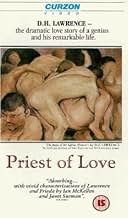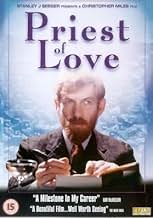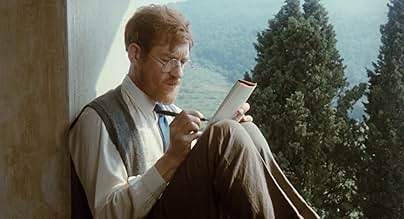अपनी भाषा में प्लॉट जोड़ेंFollowing the banning and burning of his novel, "The Rainbow", D.H. Lawrence and his wife, Frieda, move to the United States, and then to Mexico. When Lawrence contracts tuberculosis, they r... सभी पढ़ेंFollowing the banning and burning of his novel, "The Rainbow", D.H. Lawrence and his wife, Frieda, move to the United States, and then to Mexico. When Lawrence contracts tuberculosis, they return to England for a short time, then to Italy, where Lawrence wrote "Lady Chatterley's ... सभी पढ़ेंFollowing the banning and burning of his novel, "The Rainbow", D.H. Lawrence and his wife, Frieda, move to the United States, and then to Mexico. When Lawrence contracts tuberculosis, they return to England for a short time, then to Italy, where Lawrence wrote "Lady Chatterley's Lover".
- Dr. Uhfelder
- (as Mike Morris)
कहानी
क्या आपको पता है
- ट्रिवियाThis movie, from conception to release, took about 10 years to achieve fruition.
- भाव
Herbert G. Muskett: [looking at a copy of Lawrence's book "Kangaroo"] It does not appear to be obscene in absolutely legal terms. Anti-British to the point of insanity.
Clerk to Herbert G. Muskett: Apparently, Mr. Lawrence is going to America.
Herbert G. Muskett: We must inform the authorities.
Clerk to Herbert G. Muskett: It's been attended to, Mr Muskett.
[reaching for the book]
Clerk to Herbert G. Muskett: Shall I take this?
Herbert G. Muskett: Leave it. I shall read it again. To make absolutely sure
[recommences intense study of the book]
- इसके अलावा अन्य वर्जनAn abridged 99 minute "Centenary version" was released in 1985 in the UK to better box office and critical acclaim to commemorate the birth of D.H.Lawrence. As well as inevitable cutting of some material the shortened version also rearranges the placement of some of the flashback sequence and ends with Lawrence's death excluding the New Mexico epilogue. The short version is a properly re-prepared effort however with the appearance order end-credits redone to reflect the new positions in which characters first appear. Copies of the 1981 version, which was first released in the UK during the 1982 Falklands War when theatre going plummeted, now no longer exist.
- साउंडट्रैकThe Way We Get It Together
music by Francis James Brown and Stanley Joseph Seeger (as Joseph James)
Lyrics by Christopher Cone
Played by The Pasadena Roof Orchestra
It is therefore perhaps not surprising that after the war Lawrence and Frieda decided to leave Britain and to lead a peripatetic existence wandering around the world, a journey that would take them to France, Italy, Australia, Mexico and the USA. They did so partly because Lawrence needed a warmer climate for the sake of his health- he was suffering from the tuberculosis that would eventually kill him- but the way in which he had been treated in the UK must also have been a factor. The film follows them on their journey and also deals with the writing of Lawrence's last and most controversial novel, "Lady Chatterley's Lover", compared to which "The Rainbow" is about as racy as a children's nursery rhyme.
Although the film features some major names of the British cinema and a bona fide Hollywood goddess in the shape of Ava Gardner, it seems to have aroused little attention. It was not a success on its release in 1981, and I had never heard of it before I recently caught it on television. I note that mine is only the third review of it on this site which suggests that few other people had heard of it either.
And the reason nobody seems to have heard of it is that, frankly, it is not very good. Probably the best acting comes from John Gielgud in a cameo as the pompous Herbert G. Muskett, the reactionary functionary charged with protecting the British people from exposure to literature and who seemed to take a particular delight in persecuting Lawrence. None of the other cast members, however, stand out. Although the title hints at Lawrence's passionate nature, you get little idea of this from Ian McKellen's surprisingly passionless performance. Janet Suzman's Frieda seems too unsympathetic, with the sort of cinematic German accent more normally associated with Nazis barking "ve haff vays und means". Both these performances came as a disappointment to me, because both McKellen and Suzman have been much better in other films.
The screenplay was based upon a non-fiction biography of Lawrence, not always the best source to use when making a fictionalised biopic. The resulting film is just a tedious drawn-out chronicle of two people, one of them seriously ill, journeying around the world, with various artistic and literary celebs from the 1920s occasionally popping up. ("Oh look! Is that Aldous Huxley over there? And could that be Katherine Mansfield? Quick, or else you'll miss her"). Screenwriter Alan Plater and director Christopher Miles might just as well have tried to film the entry on Lawrence from the Encyclopaedia Britannica. Had they done so the result could hardly have been duller than what they actually came up with. 4/10
- JamesHitchcock
- 23 अक्तू॰ 2019
- परमालिंक
टॉप पसंद
- How long is Priest of Love?Alexa द्वारा संचालित
विवरण
इस पेज में योगदान दें



































